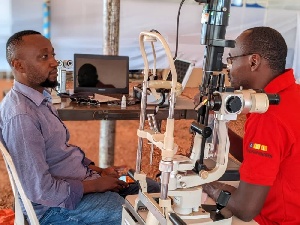- Home - News
- Elections 2024
- News Archive
- Crime & Punishment
- Politics
- Regional
- Editorial
- Health
- Ghanaians Abroad
- Tabloid
- Africa
- Religion
- Photo Archives
- Press Release
General News of Friday, 23 May 2025
Source: www.ghanawebbers.com
'Mineral royalties stay in Accra while mining communities rot' - Chamber of Mines boss
Ahmed Nantogmah, the Acting Chief Executive of the Ghana Chamber of Mines, has criticized the misdirection of mineral royalties. He warns that mining communities are decaying while most revenue stays in Accra.
Speaking on PM Express Business Edition, he said, “Mineral royalties stay in Accra while communities rot.” Although mining companies invest in schools and clinics, the returns from royalties rarely benefit local communities.
He noted that some schools and hospitals are run by mining companies. “The mining company cannot do everything,” he added.
When royalties are paid, they should support community development. However, Mr. Nantogmah questioned if they are being used for that purpose.
He cited Gold Fields Ghana as an example. Despite paying royalties to the state, it had to build a 33-kilometre road in its host community. “Why would an assembly ask Gold Fields to develop the road?” he asked.
Mr. Nantogmah called for a Mineral Revenue Management Law to regulate royalty usage. He pointed out that there is already a law for petroleum revenue management.
He believes this new law should focus on essential developments like education and health. “Royalties shouldn’t be used for salaries or recurrent expenses,” he stated.
“If the law specifies how to use mineral royalties, you must follow it.” He challenged the notion that mining companies alone cause poor conditions in these communities.
He mentioned Obuasi and questioned whether royalties return to those areas and how they are used. A recent study found that about 80% of benefits from Ghana’s minerals go to Accra, leaving local communities with little impact.
“So Ghana is developing on mining's back, but local communities are not,” he said. He insisted that local authorities also share blame for underdevelopment due to mismanagement of royalties.
“Let’s question development authorities too,” he urged. “We need targeted use of mineral royalties.”
Mr. Nantogmah concluded with a call for better planning and coordination in mining towns. “If towns aren’t planned well, it’s not up to mining companies to fix them,” he said. Proper laws and targeted investments are necessary for improvement.
Entertainment










